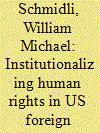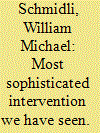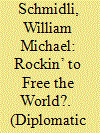|
|
|
Sort Order |
|
|
|
Items / Page
|
|
|
|
|
|
|
| Srl | Item |
| 1 |
ID:
102947


|
|
|
|
|
| Publication |
2011.
|
| Summary/Abstract |
This article examines U.S.-Argentine relations during the period of military dictatorship (1976-1983). I argue that during the Gerald R. Ford administration, Secretary of State Henry Kissinger's subtle support for the Argentine military junta-despite widespread state-sanctioned violence against perceived subversives-was a continuation of a historical process rooted in the early years of the Cold War: U.S. support for anticommunist Latin American military establishments. By contrast, Jimmy Carter's effort to promote human rights in U.S.-Argentine relations was a courageous effort to fulfill his campaign promise to bring "competence and compassion" to the Oval Office. Although clearly not unlimited, Carter's emphasis on human rights, particularly evident in his selection of Patricia Derian as Assistant Secretary of State for Human Rights and Humanitarian Affairs, provided an unprecedented government-sanctioned arena for human rights advocacy.
|
|
|
|
|
|
|
|
|
|
|
|
|
|
|
|
| 2 |
ID:
111567


|
|
|
|
|
| Publication |
2012.
|
| Summary/Abstract |
In May 1977, in a public forum, President Jimmy Carter laid out the foundations of a distinctive foreign policy programme for the United States. He offered a striking shift away from the Cold War realpolitik of previous American administrations. Human rights, he declared, would be a central component of United States foreign policy. The growing instability in Central America, especially in Nicaragua, during Carter's term of office provided a major test of his Administration's new programme. And its ultimate response to Nicaraguan instability thus provides key insight into the strengths and weaknesses of the thirty-ninth President's attempt to move beyond traditional, hard-line Cold War diplomacy.
|
|
|
|
|
|
|
|
|
|
|
|
|
|
|
|
| 3 |
ID:
185937


|
|
|
|
|
| Summary/Abstract |
It was the culminating moment in what was billed as the most ambitious music event ever staged. On October 14, 1988, 30,000 exuberant spectators packed the Estadio Mundialista football stadium in Mendoza, Argentina for the penultimate event in the Human Rights Now! concert series, a globe-trotting tour with performances in fifteen countries on four continents. Organized by the human rights organization Amnesty International (AI) to commemorate the fortieth anniversary of the Universal Declaration of Human Rights, the tour showcased some of the most distinguished popular musicians of the era: Bruce Springsteen, Sting, Peter Gabriel, Tracy Chapman, and Youssou N’Dour. Over a six-week period, more than a million people attended concerts, volunteers handed out 1.2 million copies of the Declaration, and hundreds of thousands of concert-goers signed a petition calling upon governments to ratify international human rights treaties and protect human rights advocates.
|
|
|
|
|
|
|
|
|
|
|
|
|
|
|
|
|
|
|
|
|